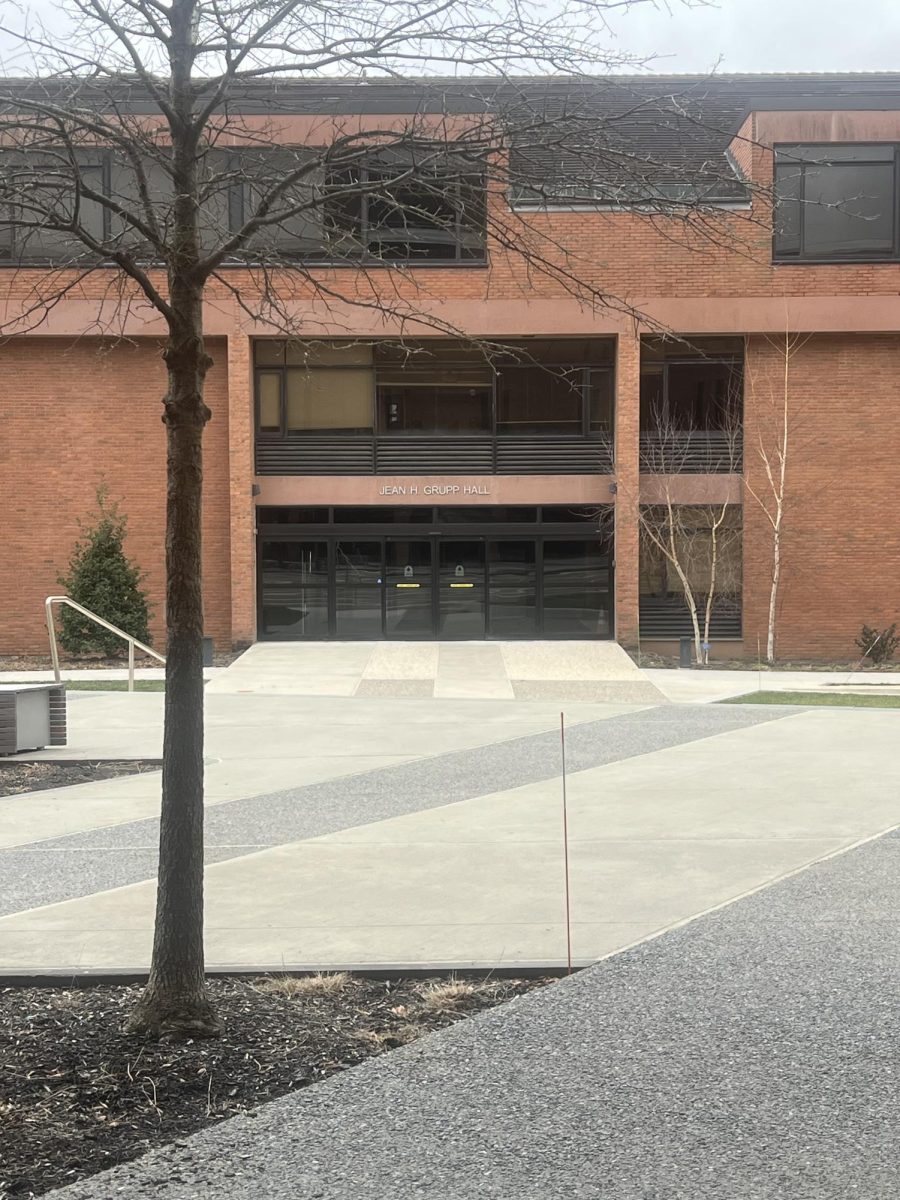The doors have opened as remediation continues for the bottom two floors at Jean H. Grupp Hall at the Bucks Newtown Campus after closing in the fall semester due to an environmental scan that found high levels of lead, legionella and radon.
Throughout the start of the fall 2023 semester, the bottom two floors at Grupp Hall closed after an environmental contamination scan found levels of lead, legionella and radon in potable water and the atmosphere. These exceeded the levels that the U.S. Environmental Protection Agency (EPA) deemed safe but did not call for immediate evacuation. The scan also revealed contaminates including per- and polyfluorinated substances(PFAS) and mold. These contaminants were found throughout the lower floors of Grupp Hall and the four cottages on the Newtown Bucks Campus.
This had a negative effect on classes and departments that call Grupp Hall home causing class and office location changes. The Literature and Language department which was housed in the basement of Grupp Hall was originally going to be transferred to the four Cottages. Unfortunately, preliminary EPA testing before the department’s transfer showed they would also need to go through radon remediation according to Dr.Kathi Knight a Professor in Biology and Environmental Science and Co-Chair of the Building Related Illnesses Committee.
Knight explains the decomposition of Uranium which leads to the production of Radon-222 gas in the lower levels. “Radon gas is heavy and in this state, it is typically confined to basements or lower levels of buildings. Radon is radioactive and it continues to undergo radioactive decay. Its progeny is also radioactive, but these progeny are particulate (solid) which can adhere to dust and other surfaces,” Knight said.
New flooring can be seen in Grupp Hall due to contaminants found in carpet glue and carpeting fibers such as PFAS.
Both Grupp Hall and the four Cottages on Campus have gone through remediation for the found contaminates the EPA recommends as a precaution for the health and wellbeing of students and staff on campus.
The water fountains in Grupp Hall remain closed after transferring Bucks Campus well water supply to Newtown water due to lead contamination which could stem from a variety of sources such as old pipes, soldering or even the fountains structure.
Knight said, “The water fountains in Grupp are going to be replaced with lead filters as soon as possible and it is currently in process. This also includes all faucets for drinking, food and cooking in Grupp, Founders, Early Learning Center, Intermediate Unit and Culinary Classes located in Tyler Hall.”
Buck’s infrastructure, originally from the 1970s, makes the buildings very susceptible to leaks from deteriorating infrastructure, leading to mold and water damage. Knight says the only way to prevent this would be to fix the source of the leak, and then afterward repair damages done from mold and water once the leak has been controlled.
Unfortunately with the massive size of the buildings needing repairs a new roof to fix the leaks could cost upwards of a million dollars Knight stated. Knight explains that Buck’s Goal when established was always to divide the amount paid for tuition among three parties including student pay, state pay and county pay. Each party would contribute 33.3% which would help Buck’s be in a better position to fix repairs for students and staff.
Knight states, “They need to invest in our students. The Faculty Union Executive Committee has specifically asked the County Commissioners for more financial support and are awaiting an answer.” She explains every two weeks an Update Meeting is held with members of the College Administration, Faculty Federation, Physical Plant members and the Project Manager. Eric Siddell, the project manager, provides updates and coordinates all remediation.
Dr. Mary Dura, a Bucks health sciences professor, and Knight oversee the remediation process with other faculty and college administrators in the Building Related Illnesses Committee. Knight states, “Both Eric Siddell and Eric Andrews from Physical Plant are doing excellent work on this entire process.”
The Board of Trustees oversees all work and repairs being done at the College. “They have been very supportive of the remediation work needed such as Chair Board of Trustees, Tom Jennings,” Knights said.
The full remediation process will be a years-long process. “The faculty union will also invite the County Commissioners to a Steering Meeting in the near future to follow up on additional financial support,” according to Kathi Knight.
EPA testing information can be found on the “Campus Health and Safety Updates” website at https://www.bucks.edu/resources/security/health-safety/.


